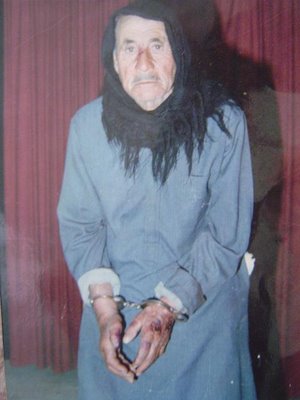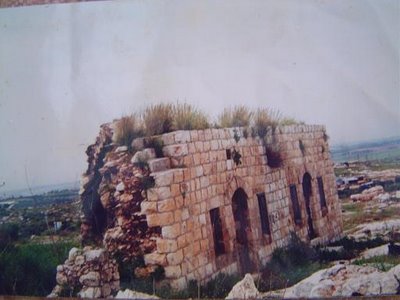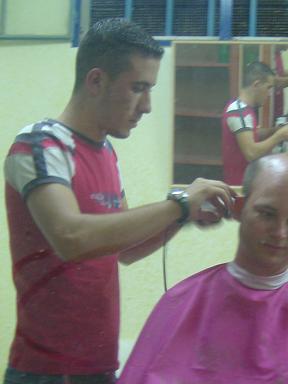



"The Barber" is a young man I met in 2003 in Jayyous. Here he is in August 2006 cutting hair in his brand new "salon." It's one of seven barber shops in this small village (pop 3,000), so none of them get much business. Why open a new barbershop with such stiff competition? Two reasons:
1 - He had to drop out of college (stucying business) because his family can no longer pay tuition (about $2000 a year plus living expenses at An Najah univ. in Nablus), because his father is a schoolteacher and school teachers haven't been paid for 6 months (since the world started punishing Palestinians for electing the Hamas government).
2 - He can't work on his families land because it is on the other side of the separation barrier, and he has no permit to go through the agricultural gate. His brother and father have permits. He says "I don't know why; I never made any problem for Israel."
So, he's a barber. Better than his friends sitting there on the couch. One of them, "N," also had to leave school, and has had absolutely nothing to do for a year now. So he sits in the barber shop. I visited two other friends that I knew since 2003. Both are young men. One took a job doing construction for the settlers. It was explained to me that this used to be considered collaboration with Israel, and "guys wearing balaclavas would come for you." But now given the economic situation, it's overlooked. The other friend sneaks into Israel to work. He carries four different forged identity cards, one for each area he works in. Others are doing the same, sneaking through holes in the separation barrier to find work.
THE BARBER'S GRANDFATHER
The Barber's family owns land on the other side of the separation barrier, near the settlement of Zufim. In fact, their grandfater had his home there. In the mid eighties, "brokers" came to the grandfather wanting to buy his land. According to the story, they disguised themselves as police, and said they had come to search his home for weapons. He allowed this, and when they found none, they said, "you must sign this paper as a proof that you have no weapons." Unable to read or write Hebrew but sensing a trap, he refused. In fact, it's now known that the men were indeed land buyers for the settlement, and the paper, had he signed, was an agreement to sell. Refusing wasn't enough, however. The "brokers" handcuffed him and pushed him to the ground down a hillside, and broke both of his thumbs trying to force him to sign. Finally, a dog from a neighboring Beduin community came to the rescue, alerting community members, and the brokers fled. Still handcuffed, his brothers brought him to all the Israel police stations in the area; it took two days to get the handcuffs removed. Evidently, during that time, these photos were taken.
Today the land still belongs to the Barber's family, but is in constant threat of confiscation since it is now on the "Israeli" side of the barrier. The grandfather's home, however, has been destroyed by settlers. So in place of his grandfather's dream of a new village lie ruins of a Palestinian house, and a growing Israeli settlement next door.
Meanwhile, the family lives in a small, tidy home, with dilapidated furniture covered with sheets, and walls that have not been painted in so long that the bare concrete shows in many places. When one sees this poverty it is easy to think of it as somehow natural as part of the situation of a "developing country"; but in fact, this poverty is artificually caused by the occupation. The combination of the separation barrier and the cut-off of funding for school teachers makes them poor.
No comments:
Post a Comment